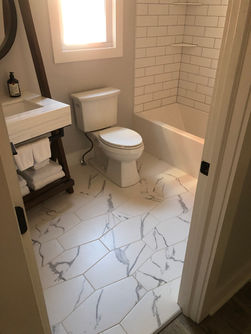Luxury Vinyl Flooring
Features of Luxury Vinyl Flooring
Cost Effective
Vinyl flooring is relatively inexpensive when compared to other flooring solutions.
Durable
Vinyl flooring is made of several durable layers with an added coat of protection on top.
Versatile
Vinyl floors can be used in a wide variety of applications, and pretty much anywhere in the home.
About Vinyl Flooring
LVP (luxury vinyl plank) and LVT (luxury vinyl tile) can be used pretty much anywhere in the home and are great products if you’re looking to save on money but still get an elegant look. They are a top choice for Weekend Warriors because they are readily available, easy to use, and not as expensive as traditional hardwood flooring. They also take less time to acclimate to the environment before installation than hardwood. This type of flooring can typically be installed on top of existing flooring that is structurally sound and in good shape. Vinyl cannot be installed on top of carpet (obviously) or cushioned linoleum. Many people will use luxury vinyl plank or tile on top of existing hardwood because it is much cheaper than refinishing unless you do it yourself.
Why Choose Vinyl Flooring?
Luxury vinyl flooring has rapidly gained popularity as a versatile and cost-effective alternative to traditional flooring materials. Its advanced manufacturing techniques create incredibly realistic designs that mimic the texture and appearance of natural materials like hardwood, stone, and tile. Here's why luxury vinyl flooring is a top choice:
Aesthetics
Luxury vinyl tile and plank captures the intricate details of natural materials, giving your space an authentic and sophisticated look without the high costs and maintenance associated with those materials.
Durability
Engineered to withstand the rigors of everyday life, luxury vinyl flooring is designed to resist scratches, scuffs, stains, and moisture. This makes it an ideal choice for high-traffic areas, homes with pets, and spaces prone to spills.
Easy Maintenance
Say goodbye to hours of tedious cleaning. Luxury vinyl flooring is a breeze to maintain. Regular sweeping and occasional damp mopping are all you need to keep your floors looking impeccable.
Cost Effective
Achieve the high-end look you desire without breaking the bank. Luxury vinyl flooring offers an affordable way to elevate your interior design while maintaining quality and longevity.
Easy Installation
Whether you prefer the elegance of luxury vinyl tiles or the rustic charm of vinyl planks, our flooring options come with user-friendly installation methods, including click-lock systems and adhesive options.
Shop Luxury Vinyl Flooring
We are your ultimate destination for top-quality luxury vinyl flooring that seamlessly combines style and functionality. Our commitment to customer satisfaction, combined with an exquisite range of designs, ensures you'll find the perfect flooring solution for your project. Experience the beauty and performance of luxury vinyl tile and luxury vinyl plank flooring with us.





